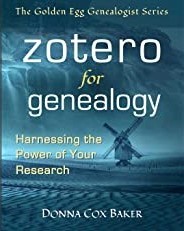There are a number of books languishing on my library shelves, bought with good intentions and the promise to read when I get around to it. Donna Cox Baker's Zotero For Genealogy is one such book which needs to get pulled down from its resting place, opened up and put to good use. Given what a great research tool Zotero can be, and given how much we need to keep track of resources in tracing our family history, I figured the book was a perfect fit for someone like me.
Zotero is a free open-source software program useful for organizing reference material—books, journals, even .pdf files, or any records accumulated when we research our roots. The software was originally developed by a nonprofit organization now known as the Corporation for Digital Scholarship, whose own roots reach back to George Mason University. Its nearly seamless operation helps researchers harvest bibliographic information from far-ranging subjects, thus making it a familiar tool for many who have recently completed graduate study programs.
One of those "many" is author Donna Cox Baker, Ph.D., perhaps best known in genealogy circles for her online project, Beyond Kin and her GenoHistory website. As a historian, her approach is to carefully weave genealogy into the broader perspective of history, which requires an organized system for keeping track of the many reference citations important in such projects.
Since I already am deeply immersed in genealogy, and am well aware of the power of Zotero, Donna's 2019 paperback edition seemed a logical purchase for me. While the book's promise of eliminating paper and physical filing and reducing the duplication of keystrokes with those tedious citations necessary for journal publication may be tempting, my main reason for getting her book was to see her method for blending the basics of the software with the specifics of genealogy research.
"Harnessing the Power of Your Research" is not just the book's subtitle; it certainly speaks to someone drowning in reference material like I am. I'm looking forward to putting the program—and the book—through its paces, especially for some of the research goals I've set out for myself this year.

I, too, have this book and bought both the Kindle version (first) and then the paper version. I found learning to use Zotero with Kindle was a bit challenging. It was much easy to flip pages and scan for specific skills with the hard copy.
ReplyDeleteThanks for the input, Linda. I had been wondering whether I should have sprung for the Kindle version instead, thinking it would be easier to search for a specific passage, especially a "how to" section, in the Kindle version. But you are right: sometimes, it's just easier to open the book up to the right spot and leave it there for consultation. I guess it depends on the reader's preferences.
Delete